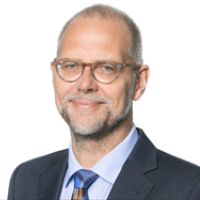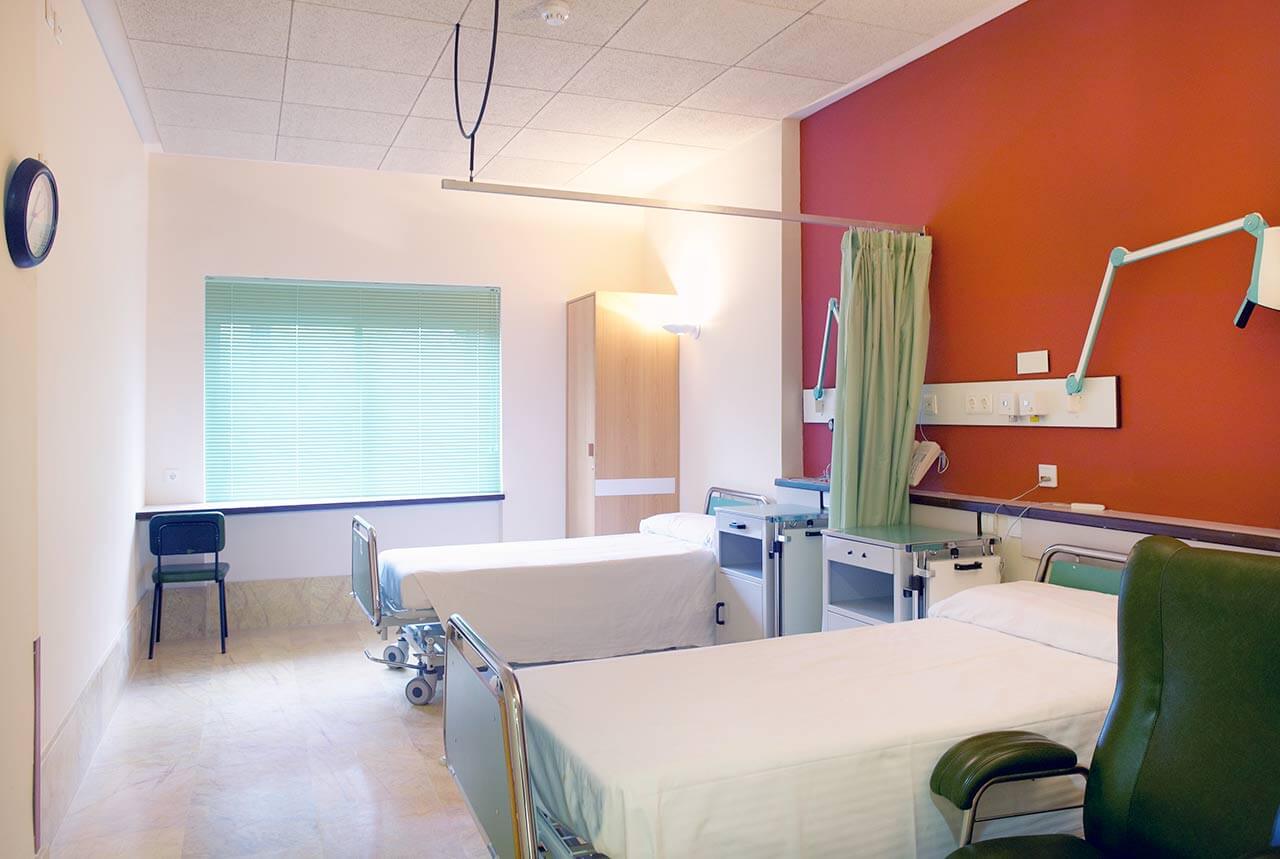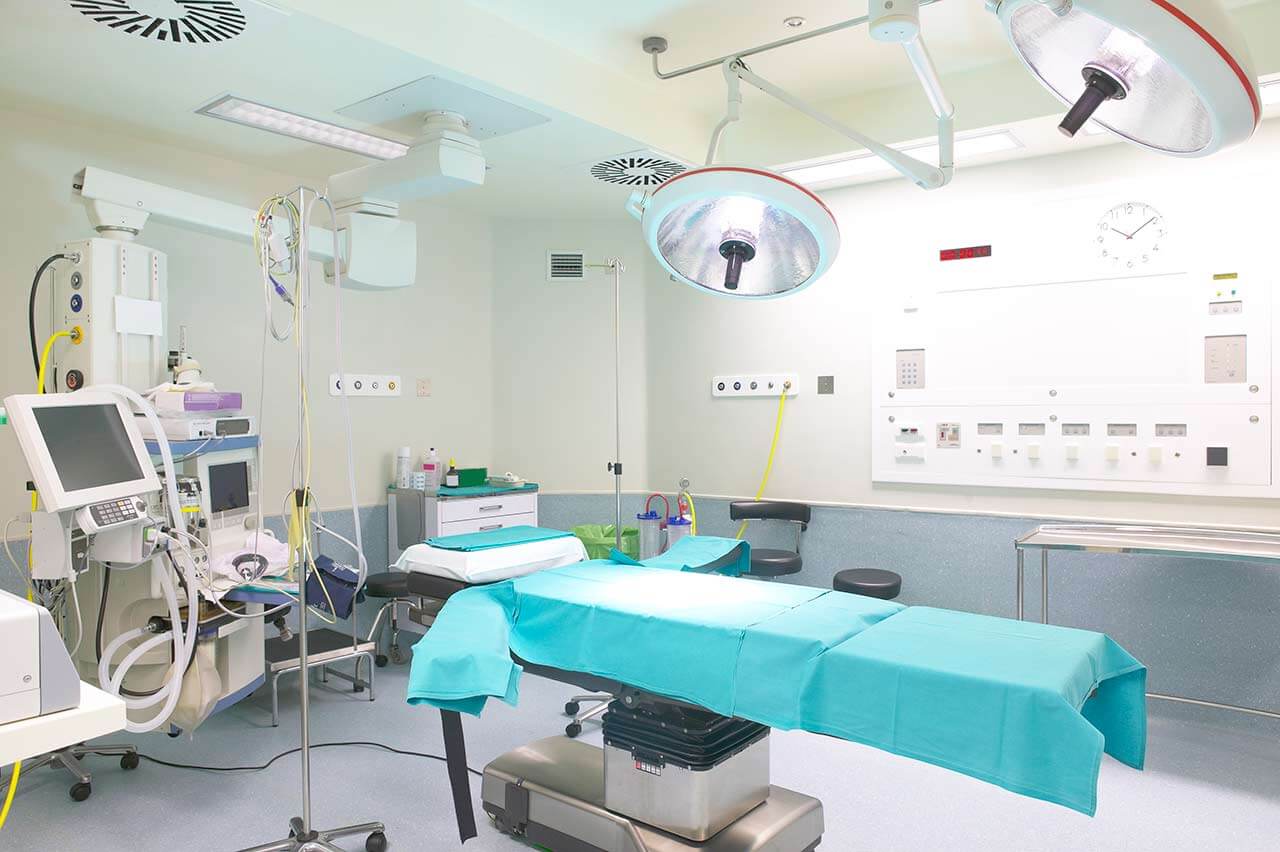
The program includes:
- Initial presentation in the clinic
- clinical history taking
- physical examination
- review of medical records
- laboratory tests:
- complete blood count
- general urine analysis
- biochemical analysis of blood
- TSH-basal, fT3, fT4
- tumor markers (AFP, CEA, СА-19-9)
- indicators of inflammation (CRP, ESR)
- indicators blood coagulation
- abdominal ultrasound
- gastroscopy and colonoscopy with biopsy
- CT/MRI abdomen
- preoperative care
- endoscopic bougienage/ stenting of stenosis
- symptomatic treatment
- control examinations
- the cost of essential medicines and materials
- nursing services
- nutrition recommendations
- full hospital accommodation
- explanation of future recommendations
Required documents
- Medical records
- MRI/CT scan (not older than 3 months)
- Biopsy results (if available)
Service
You may also book:
 BookingHealth Price from:
BookingHealth Price from:
About the department
The Department of Gastroenterology at the Hospital Cologne-Merheim offers all the possibilities of modern medicine in the field of its competence. The medical facility provides diagnostics and effective treatment for diseases of the stomach, small intestine, large intestine, esophagus, and pancreas. The department's team of gastroenterologists has exceptional professional skills in the treatment of patients with oncological diseases of the gastrointestinal tract. In such cases, abdominal surgeons, oncologists, radiation therapists, and other highly specialized physicians work hand in hand. The department also has vast experience in the treatment of benign digestive diseases, including inflammatory bowel disease, gastroesophageal reflux disease, infectious gastrointestinal diseases, achalasia cardia, Zenker's diverticulum, gastritis, ulcers, polyps, etc. During treatment, the department's physicians strive to use only drug therapy and diet therapy, but they may also resort to endoscopic procedures. The department houses the largest Endoscopy Center in North Rhine-Westphalia, where more than 12,000 procedures are performed every year. The center has state-of-the-art equipment, thanks to which the efficiency and safety of endoscopic procedures are at a high level. High-quality sedatives are used for the maximum comfort of patients during endoscopic treatment. The department is headed by Prof. Dr. med. Arno Dormann.
In cooperation with abdominal surgeons, the department's doctors treat patients with gastrointestinal cancers. Of particular interest is the treatment of stomach and esophageal cancer. The resection of a malignant tumor is often required to achieve successful treatment outcomes. In the early stages of stomach and esophageal cancer, the specialists at the Endoscopy Center perform endoscopic mucosal resection (EMR) or endoscopic submucosal dissection (ESD). These procedures provide patients with good results but differ from classical surgery in that they are minimally traumatic and virtually free from surgical risks. The treatment of early-stage stomach and esophageal cancer with endoscopic procedures is inadvisable, so abdominal surgeons are involved in the therapeutic process, and their task is to remove the malignancy or perform a resection of the affected organ. The endoscopic procedure or surgery is often complemented by chemotherapy and/or radiation therapy.
The department's doctors regularly deal with the treatment of patients with gastroesophageal reflux disease (GERD). The pathology is chronic and occurs due to esophageal sphincter dysfunction, leading to the reflux of stomach acid into the esophagus and irritating its walls. Patients with suspected GERD may require examinations such as narrow-band imaging endoscopy, intragastric pH monitoring, impedance pH monitoring, swallowing assessment with contrast enhancement, chest CT scanning, and gastric scintigraphy. Treatment tactics are developed individually for each patient. Conservative treatment options are considered first, including lifestyle modifications (smoking cessation, weight loss, and a healthy diet) in combination with drug therapy using proton pump inhibitors and other drugs. In some clinical cases, effective results can only be achieved through surgery. In such cases, abdominal surgeons perform fundoplication or implant the LINX Reflux Management System. The last surgical option is innovative but has already proven to be highly effective. GERD surgery is performed using laparoscopic techniques.
The medical facility also provides medical care to patients with gastritis, gastric ulcers, achalasia cardia, Zenker's diverticulum, ulcerative colitis, Crohn's disease, stomach polyps, bowel polyps, and other benign pathologies. Doctors most often prescribe an individually developed drug therapy regimen and a diet to treat the above-mentioned diseases. The second-line treatment is endoscopic intervention, and in the most complex cases, minimally invasive surgery may be performed.
The department's range of diagnostic and therapeutic services includes:
- Endoscopic examinations
- Gastroscopy
- Colonoscopy
- Esophagogastroduodenoscopy
- Magnifying endoscopy with narrow-band imaging
- Chromoendoscopy
- Endosonography
- Esophageal manometry
- pH metry
- Endoscopic therapeutic procedures
- Polypectomy
- Balloon dilatation and botulinum toxin injections for achalasia cardia
- Endoscopic mucosal resection (EMR) and argon plasma coagulation for early-stage gastrointestinal tumors
- Balloon dilatation and stent implantation into the stomach and esophagus
- Latex ligation and endoscopic obliteration for esophageal varices using special adhesives
- Clipping, injections, and argon plasma coagulation for gastrointestinal bleeding
- Argon plasma coagulation for angiodysplasia
- Endoscopic removal of foreign bodies from the gastrointestinal tract
- Percutaneous endoscopic gastrostomy
- Percutaneous endoscopic jejunostomy
- Other diagnostic and treatment methods
Curriculum vitae
Higher Education and Professional Career
- 1982 - 1983 Biology studies, University of Marburg.
- 1984 - 1990 Medical studies, Free University of Berlin.
- Postgraduate internships: London (UK); Rochester, New Orleans (USA); Basel (Switzerland).
- Professional clinical training in gastroenterology:
- Department of Internal Medicine (focus on the treatment of infectious diseases), Charite University Hospital Berlin.
- Department of Internal Medicine (focus on the treatment of gastroenterological diseases), Hospital Minden (academic hospital at the University of Muenster).
- Thesis defense, Department of Surgery, Charite University Hospital Berlin. Subject: "Comparison of color-coded duplex ultrasonography with phlebography for assessing the deep vein system of the lower limbs in patients with varicose veins and deep vein thrombosis".
- Habilitation, Department of Gastroenterology, Hepatology and Infectology, Faculty of Medicine, Otto von Guericke University Magdeburg. Subject: "Enteral nutrition using percutaneous endoscopic gastrostomy and similar techniques: assessment and standardization of existing techniques, as well as the creation of new ones".
- 1998 - 2000 Senior Physician, Department of Gastroenterology, Hospital Minden (academic hospital at the University of Muenster).
- 2000 - 2005 Managing Senior Physician, Department of Gastroenterology, Hospital Minden (academic hospital at the University of Muenster).
- Since 2005 Head Physician, Department of Gastroenterology at the Hospital Cologne-Merheim.
Additional Qualifications
- 2000 Dietetics, German Academy of Nutritional Medicine (DAEM) and German Society for Nutritional Medicine (DGEM).
- 2003 German Society for Infectious Diseases (DGI).
- 2004 German Society for Gastroenterology, Digestive and Metabolic Diseases (DGVS).
Clinical Focuses
- Interventional endoscopy.
- Treatment of gastroesophageal reflux disease.
- Treatment of functional gastrointestinal disorders.
Memberships in Professional Societies
- German Society for Endoscopy and Imaging Procedures (DGE-BV).
- German Society for Gastroenterology, Digestive and Metabolic Diseases (DGVS).
- North Rhine-Westphalia Society of Gastroenterology.
- Professional Association of German Internists (BDI).
- German Society for Infectious Diseases (DGI).
- German Nutrition Society (DEGEM).
- European Society for Parenteral and Enteral Nutrition (ESPEN).
- Working Group of Managing Senior Gastroenterologists (AGLK).
Photo of the doctor: (c) Kliniken der Stadt Köln gGmbH
About hospital
According to the reputable Focus magazine, the Hospital Cologne-Merheim ranks among the top German medical centers!
The health facility is an academic hospital of Witten/Herdecke University, which gives patients access to the very latest developments in European medicine. The Hospital Cologne-Merheim positions itself as a maximum care medical center, which is why it offers a wide range of high-quality medical services. The hospital has 752 beds in 13 specialized departments. More than 28,000 inpatients are treated here every year. Outpatient care is also provided for many medical specialties. The hospital also collaborates closely with the University Hospital Cologne, carrying out fruitful work at the Transplant Center.
The most successful areas of clinical practice in the medical center are neurosurgery, pulmonology, transplantology, surgery (in particular, minimally invasive), cardiology, traumatology, joint replacement surgery, and plastic surgery. The Departments of Ophthalmology, Anesthesiology, Radiology, Neuroradiology, and Palliative Care are also distinguished by top-class medical service. In addition, the Departments of Neurology and Neurosurgery provide effective early rehabilitation programs for patients with stroke, traumatic brain injuries, brain tumors, and other neurological diseases. Comprehensive treatment of such a level is available only at highly specialized and best medical facilities in Germany.
The hospital has several ultramodern intensive care units, where patients in critical condition are treated.
It is worth noting that the hospital was the first in the region to be certified in accordance with KTQ® (Cooperation for Transparency and Quality in Health Care). The certification process is repeated every three years, and each time the hospital passes it with excellent results.
The basis for high-quality medical services lies in state-of-the-art equipment, the application of effective and reliable therapeutic methods, and the vast clinical experience and professionalism of doctors and nursing staff. The main value for each employee at the hospital is the patient's health. Doctors devote enough time to personal communication with patients in order to establish a trusting relationship and explain the details of upcoming treatment.
Photo: (с) depositphotos
Accommodation in hospital
Patients rooms
The patients of the Hospital Cologne-Merheim live in single and double rooms. All patient rooms are cozy and designed in light colors. Each patient room has an ensuite bathroom with a shower and a toilet. The furnishings of a standard patient room include an automatically adjustable bed, a bedside table with a pull-out tray, a wardrobe for personal belongings, a table and chairs for receiving visitors, a TV, and a telephone. Wi-Fi is also available in the patient rooms.
If desired, patients may stay in an enhanced-comfort room, which additionally provides a safe, a mini-fridge, and upholstered furniture.
Meals and Menus
The patients are offered three tasty and healthy meals a day: breakfast, lunch, and dinner. Breakfast and dinner are served as buffets, and for lunch, there is a set of three menus to choose from.
If, for some reason, you do not eat all the foods, you will be offered an individual menu. Please inform the medical staff about your dietary preferences prior to treatment.
Further details
Standard rooms include:
Religion
There is a chapel on the territory of the hospital, where Catholic and Evangelical worship is regularly held on Sundays and religious holidays. The chapel is also open daily for visits and solitude for prayers.
The services of representatives of other religions are available upon request.
Accompanying person
Your accompanying person may stay with you in your patient room or at the hotel of your choice during the inpatient program.
Hotel
You may stay at the hotel of your choice during the outpatient program. Our managers will support you for selecting the best option.




